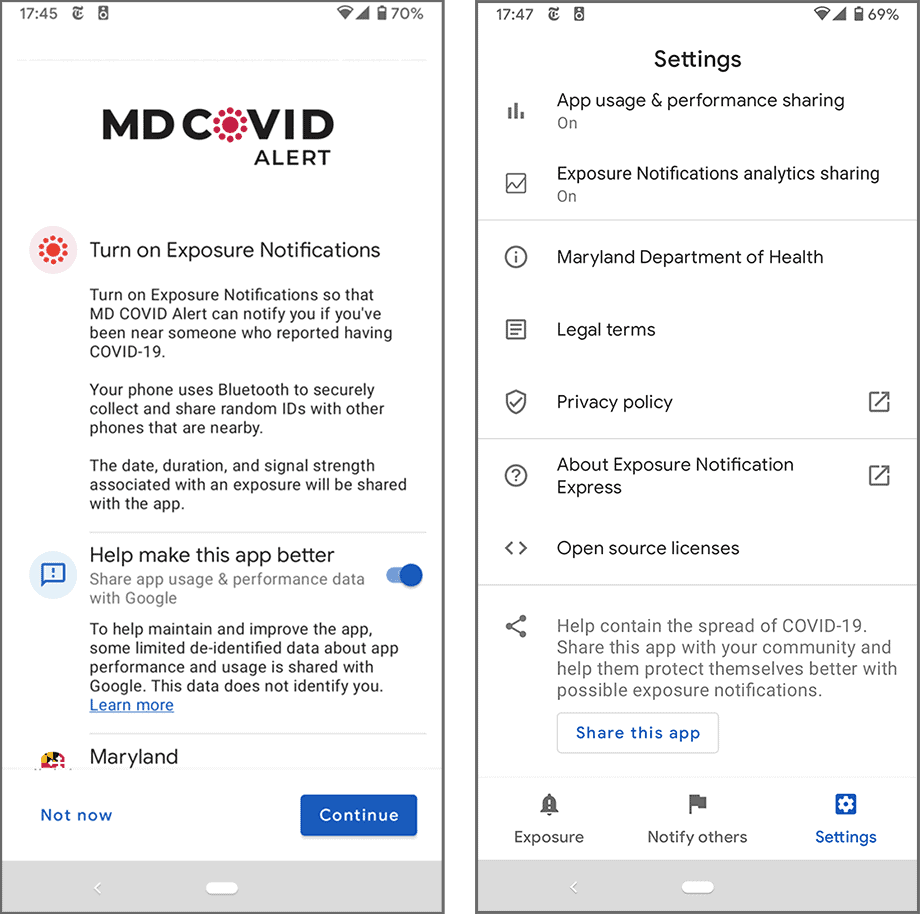Maryland Health Dept Launches COVID Alert App
Marylanders can now receive exposure notifications on smartphones
By Kathy Knotts
A new app is making it easier for Maryland residents to know if they have been exposed to someone with COVID-19.
Earlier this week, the Maryland Department of Health announced the launch of MD COVID Alert, the official COVID-19 Exposure Notifications Express system of Maryland. MD COVID Alert uses Bluetooth Low Energy technology to quickly notify users who might have been exposed to someone who tested positive for COVID-19 with the goal of reducing infections in Maryland.
“MD COVID Alert complements our traditional contact tracing efforts to notify users of possible exposure to help contain the virus,” said MDH Secretary Robert Neall.
Marylanders with an iPhone or Android smartphone will receive a push notification inviting them to receive exposure notification alerts. iPhone users will be able to opt in by enabling exposure notifications in their phone’s settings and selecting Maryland as their region. Android users will be prompted to opt in by installing the MD COVID Alert app from the Google Play Store. MD COVID Alert is available at no cost and is voluntary. Users can disable exposure notifications at any time.
The app assigns users a random number that changes every 10 to 20 minutes via Bluetooth so that it cannot be used to identify users or their whereabouts.
On a daily basis, a user’s phone downloads a list of all the random IDs associated with verified positive COVID-19 cases and checks them against the random IDs users have encountered in the two days prior to the positive test or symptom onset. If there is a match, the system will notify users of the date of exposure. No other information about the exposure is shared. Users who receive an exposure alert are advised to get tested, monitor for symptoms, and quarantine. Some users may receive a call from a contact tracer if their information is shared by an individual with COVID-19.
Users of the app remain anonymous, their location is never tracked, and no data is collected from their smartphones. Using Bluetooth technology, the system can detect if two devices are near each other without revealing where the devices are or who they belong to.
“Privacy is important. MD COVID Alert does not collect, transmit, or store personal information of users, and the system is completely anonymous,” said Dr. Katherine Feldman, MDH Contact Tracing Unit Director. “We’re asking Marylanders to add their smartphones to the fight against COVID-19 by using MD COVID Alert.”
While the new app is useful, experts caution that it is not a substitute for traditional contact tracing or for preventative public health measures that include wearing a mask, social distancing in public, frequent hand washing and avoiding large crowds.
“I encourage Marylanders to use MD COVID Alert to help protect the people around them, including those they might not know directly,” says Neall. For more information about MD COVID Alert, visit covidlink.maryland.gov/mdcovidalert.

